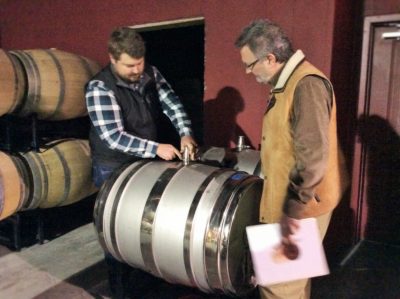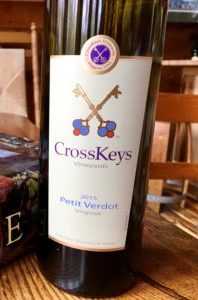
15 May 2018
CROSSKEY VINEYARDS: Wines from the Shenandoah Valley
A revelation as to the promises of grape growing and winemaking in Virginia’s Shenandoah Valley came to us in 2015, when we visited Muse Vineyards in the town of Woodstock, in historic Shenandoah County, and tasted their Virginia Governor’s Cup-winning Bordeaux blend (2009 “Clio”). That wine, and its succeeding vintages, motivated us to take a deeper dive, so to speak, into Shenandoah Valley winegrowing and carefully explore the wineries, viticultural and winemaking practices, and wines of other producers across this age-old region.
The Shenandoah Valley is the hidden gem of Virginia winemaking. It is not the most familiar or celebrated wine region in Virginia, but was actually the first to be officially recognized by the federal government as an American Viticultural Area (AVA), in 1982. The Shenandoah Valley AVA (not to be confused with the California Shenandoah Valley AVA in California’s Sierra Foothills) encompasses 10 counties in Virginia and two in West Virginia, stretching roughly north-south from the West Virginia panhandle down the Valley through Botetourt County, Virginia.
In our travels and tastings up and down Shenandoah Valley wine country we have found the region to be quite distinct from other Virginia AVAs. We have observed, as well, that grape growers and winemakers in the Valley are, perhaps more than ever since 1982, revealing their distinctions and embracing their identity as an AVA — that is, a grape-growing region having “distinguishing features” where a given “quality or characteristic” of a wine made from grapes grown in the designated area can be attributed to its geographic origin. (Paraphrased from the Alcohol and Tobacco Tax and Trade Bureau’s (TTB’s) official definition of an AVA.)
The two distinguishing characteristics of the Shenandoah Valley that most intrigue us have to do with moisture and minerality.
Moisture
In a state that is typically wet and humid during the growing season — an imperfect climate for growing wine grapes — one distinction of the Shenandoah Valley, with respect to viticulture, is relatively low levels of moisture. There is less average annual rainfall in the Valley than other Virginia wine regions; the Valley is bounded to the east and west by mountain ridges that serve as “rain shadows” — barriers to weather systems from either direction; and the Valley is far enough inland to avoid some of the big coastal storms (called “Nor’easters”) that travel up the Atlantic coastline. This is all a natural “assist” to winemakers in the Valley who, like others throughout the state, are constantly working to mitigate moisture and all the risks and worries that come with it.
Minerality
The Shenandoah Valley is encircled by the Blue Ridge Mountains to the east, Massanutten Mountain to the north, and the Allegheny Mountains to the west — Appalachian ranges that were once seabed, then thrust high as the Himalayas before partially eroding — over millions of years — into valley floor. Minerality — which could be the most distinctive, yet underappreciated, characteristic of Shenandoah Valley wines — is an attribute that could derive from the rocky, iron-rich, well-drained limestone soils strewn about over gently sloping terrain from decomposing mountainside.
In our tasting experience, minerality is, quite simply, the impression of mineral or stone (graphite, flint, chalk, iron, gravel, etc.) in a wine’s aromas and flavors — aromas and flavors that do not seem related to fruit or oak. Minerality is, in turn, a concept imbedded in the notion of terroir — which more broadly describes how a particular region’s climate, soils, terrain, elevation, and winemaking traditions influence the aromas, flavors, and overall character of a wine.
But the notion that rocks and minerals in vineyard soil somehow impart aroma and flavor attributes to wine is controversial among, and often dismissed by, geologists, soil scientists, and even some viticulturalists as being unlikely to impossible. Minerals in the soil generally have no taste, they contend, and the mineral nutrients in wine (magnesium, zinc, and iron, for example) are present only in very low, undetectable concentrations.
This could very well be accurate on a scientific basis, but winemakers in wine regions long associated with the concept of minerality — along with those who enjoy their wines — will surely disagree on a sensory basis. Chablis, for instance, in northern Burgundy, is famed for Chardonnay, typically unoaked, that smells and tastes “flinty.” But we will leave the debate on the merits of minerality to others and focus, however subjectively, on how a wine fundamentally smells and tastes. If we perceive of minerality in a wine, we will say so — at least as long as we have no other way to describe or explain what we are smelling and tasting.
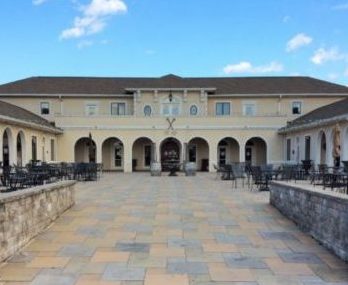 Which brings us to our latest discovery deep in the Shenandoah Valley — CrossKeys Vineyards, in Rockingham County, whose wines we do believe express the character of the land beneath and around them — wines with a “sense of place” that make a good case for minerality in the Shenandoah Valley.
Which brings us to our latest discovery deep in the Shenandoah Valley — CrossKeys Vineyards, in Rockingham County, whose wines we do believe express the character of the land beneath and around them — wines with a “sense of place” that make a good case for minerality in the Shenandoah Valley.
CrossKeys, named for the small rural community of Cross Keys southeast of Harrisonburg, was established in 2001 by Bob and Nikoo Bakhtiar. Bob and Nikoo planted their first vines that very year on land that had been covered in thick cedar forest. Today the 125-acre CrossKeys estate comprises 30 acres of vineyards surrounding a stunning winery and tasting room (pictured right) that includes a bistro as well as a large events room, called the “Key Room,” where they host a variety of special events such as wine dinners and wedding parties.
CrossKeys produces 12 wines, at present, with an average annual production of 7,000 cases — in the 2015 vintage, 90% from estate-grown fruit. With winemakers Stephan Heyns and Steve Monson at the helm in the cellar, the winery has garnered a number of awards over the past several years, including, most recently, a gold medal for their 2015 Cabernet Franc in the 2017 Virginia Governor’s Cup competition.
During a recent visit to CrossKeys, we tasted through the winery’s full portfolio and found them all to be well-crafted and appealing. One thing we immediately noticed — and appreciated — is that Stephan and Steve are careful and calculated in their use of oak in fermenting and aging CrossKeys wines. None of their wines is aged longer than 14 months in oak (most for much less time), and to a significant extent they employ neutral oak barrels to enhance a wine’s texture without imparting taste or masking natural aromas and flavors. Stephan and Steve also are experimenting with Modern Cooperage (pictured above) — a stainless steel barrel with insertable oak staves — which gives them full control over oak exposure throughout the fermentation and aging process.
We recommend that you visit CrossKeys Vineyards and taste their wines, relax in the tasting room or on the patio, stroll around their gorgeous property, and meet the Bakhtiar family. In the mean-time, we share our tasting notes on four of our favorite CrossKeys selections, below.
CrossKeys Vineyards Petit Verdot 2015
Shenandoah Valley
91 Points | “Highly Recommended”
Petit Verdot is a darling variety in Virginia right now. It is hardy, thick-skinned, tannic, and late-ripening, and in Virginia’s warm, humid climate develops full ripeness with good acid retention. The 2015 CrossKeys Petit Verdot is emblematic of the variety’s potential in the state. It is, visually, a thing of beauty, with deeply saturated purple pigmentation and pronounced viscosity. It is just as pleasurable to smell and taste, with aromas of macerated boysenberry, jasmine tea, and iron that lead to flavors of black cherry and cranberry, toasted almond, and juniper berry — all framed by notes of cured tobacco, clove, and muted oak over a tangy finish. It is dry and full-bodied, with chewy tannins and mild acidity. It aged for nine months in 11% new French oak, 7% new American oak, and 82% neutral oak barrels. It is zesty and quite muscular on the palate, and will pair well with robust cheeses, spicy dishes, and smoked meats; indeed, a great barbecue wine.
13% ABV | 450 Cases Produced | $28
Drink Now or Hold
CrossKeys 2015 Petit Verdot is enjoyable now with a half hour’s decant, and should develop nicely through 2022.
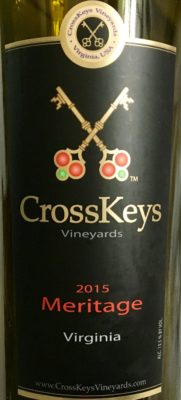 CrossKeys Vineyards | Meritage | 2015
CrossKeys Vineyards | Meritage | 2015
Shenandoah Valley
90 Points | “Highly Recommended”
The 2015 CrossKeys Meritage (rhymes with “heritage”) is a blend of three traditional Bordeaux varieties — Petit Verdot (38%), Merlot (37%), and Cabernet Franc (25%) — and is a classy tribute to Old World sensibilities. Aromas suggesting blackberry preserve, violet, and semi-sweet chocolate lead to flavors of macerated dark fruit, bell pepper, and cured tobacco — all layered with notions of grilled herbs, vanilla bean, and leather over a lingering finish. Deep-set impressions of stony minerality are present from beginning to end. The wine is dry, with chewy tannins, mild acidity, andspicy, herbaceous oak. It aged for 14 months in 18% new American oak, 13% new French oak, and 69% neutral oak barrels. The wine is savory and elegant on the palate, and will pair well with robust cheeses, seared filet mignon, grilled vegetables, and other such hearty fare.
13.5% ABV | 350 Cases Produced | $30
Drink Now or Hold
CrossKeys 2015 Meritage is enjoyable now with an hour’s decant, and should develop nicely through 2023.
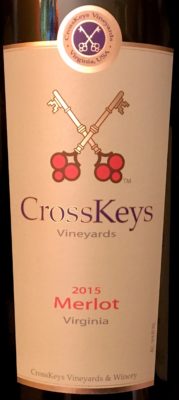 CrossKeys Vineyards | Merlot | 2015
CrossKeys Vineyards | Merlot | 2015
Shenandoah Valley
90 Points | “Highly Recommended”
This is another CrossKeys red that tips its hat, stylistically, to its vinicultural brethren across the Atlantic (you would be hard-pressed to mistake it for a California Merlot). On the nose are notions of mixed berry compote, damson plum, and toasted nuts; and on the palate, suggestions of blueberry preserve, toffee, and allspice — all interwoven with impressions of graphite, cured tobacco, and subtle, cedar-tinged oak over a savory finish. The wine is dry and full-bodied, with chewy tannins and mild acidity, and offers terrific concentration and balance for this variety in Virginia. It aged for nine months in 30% new French oak and 70% neutral oak barrels. It is food versatile, and will pair well with medium-sharp cheeses, grilled meats, roasted eggplant, braised pork chops, and other such savory fare.
13% ABV | 350 Cases Produced | $22
Drink Now or Hold
CrossKeys 2015 Merlot is enjoyable now with a half hour’s decant, and should develop nicely through 2022.
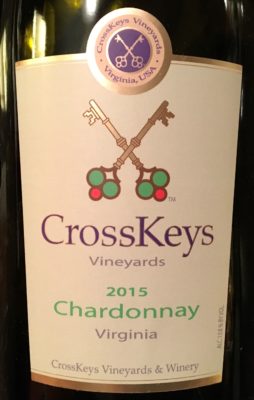 CrossKeys Vineyards | Chardonnay | 2015
CrossKeys Vineyards | Chardonnay | 2015
Shenandoah Valley
88 Points | “Recommended”
Virginia Chardonnay tends to be fresh and elegant when not over-oaked, and this is a fitting example. It opens with aromas of baked peach, toasted almond, and coriander; transitions to flavors of ripe apricot, Rainier (yellow) cherry, and white chocolate; and finishes on mellow tones of biscuit, honey, and banana peel. There are impressions of wet stone — perhaps flint — as well, reminiscent of a good Chablis. It is dry and medium-bodied, with moderate acidity and discreetly integrated oak. 40% of the wine was fermented in stainless steel then racked to neutral oak barrels; and 60% was fermented in French oak barrels, 20% new, over nine months. It is lean and silky on the palate, and will pair well with assorted cheeses, creamy pasta dishes, savory poultry dishes, seafood, and other light fare.
12.5% ABV | 500 Cases Produced | $20
Drink or Hold
CrossKeys 2015 Chardonnay is fresh and ready to drink now and will continue to please over the next 3-4 years.
Editor’s note: In addition to the wines above, we recently featured The 2015 CrossKeys Touriga as a “Daily Wine Recommendation” with 87 points | “Recommended.” See our review at this link.
 Availability
Availability
CrossKeys wines are available directly from the winery, either at the tasting room or online. Visit them virtually at www.crosskeysvineyards.com, e-mail them at info@crosskeysvineyards.com, ring them at 540.234.0505, or visit them personally at their tasting room at 6011 E. Timber Ridge Road, Mt. Crawford, VA 22841.
CrossKeys wines may be found, as well, at select wine retailers and restaurants throughout Virginia. They are available at all Total Wine locations in the state. If you are in Virginia, or nearby, and would like information on availability in your area, contact CrossKeys’ wholesale representative at bubbles@crosskeysvineyards.com.
If you are in, near, or passing through Shenandoah County, All Things Virginia @ The Farmhouse in Woodstock carries a good selection of CrossKeys wines along with assorted other Virginia-made products. For information on their selections, visit them virtually at www.allthingsva.com, e-mail them at vicki@allthingsva.com, ring them at 540.459.9006, or visit them personally at 125 N. Main St., Woodstock, VA 22664. Heritage Mill Wines 1848 in Edinburg, just five miles down historic Route 11 from Woodstock, also carries CrossKeys wines. They are located at 214 S. Main St., Edinburg, VA, and can be reached at 540.984.4077.
For more information or questions about the wines and wineries of the Shenandoah Valley — including a list of Shenandoah Valley wineries — visit the Shenandoah Wine Trail, an association of Shenandoah Valley wineries, at:
www.shenandoahvalleywinetrail.com


